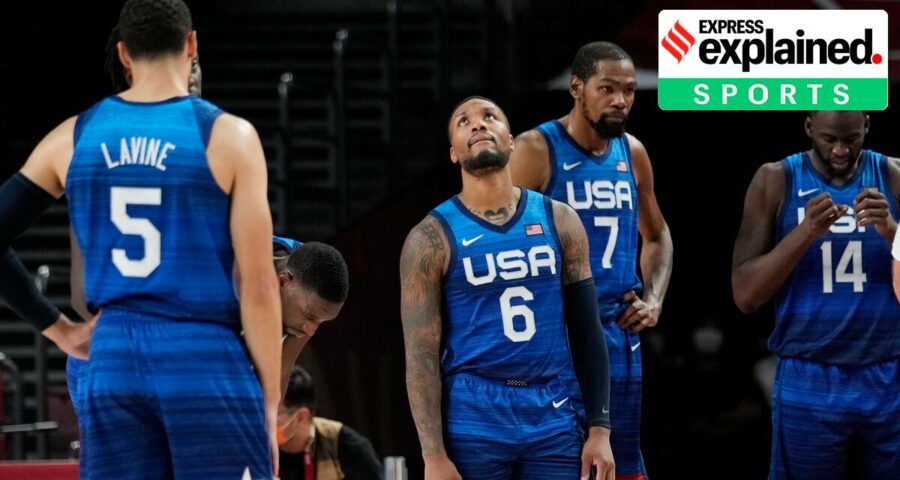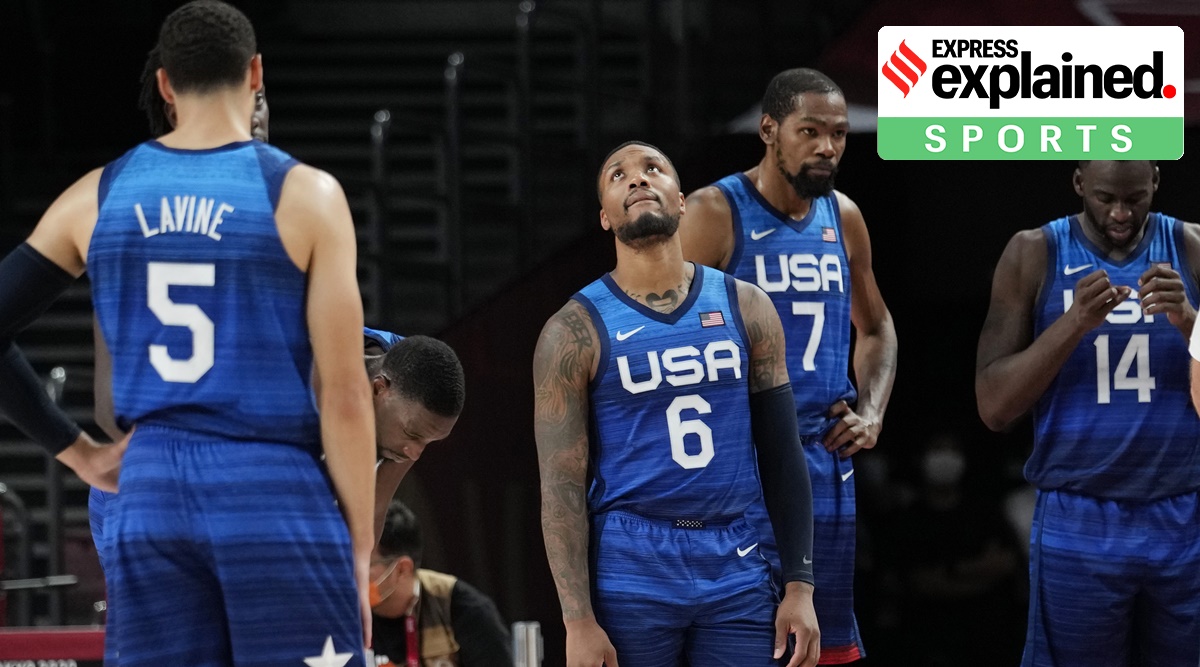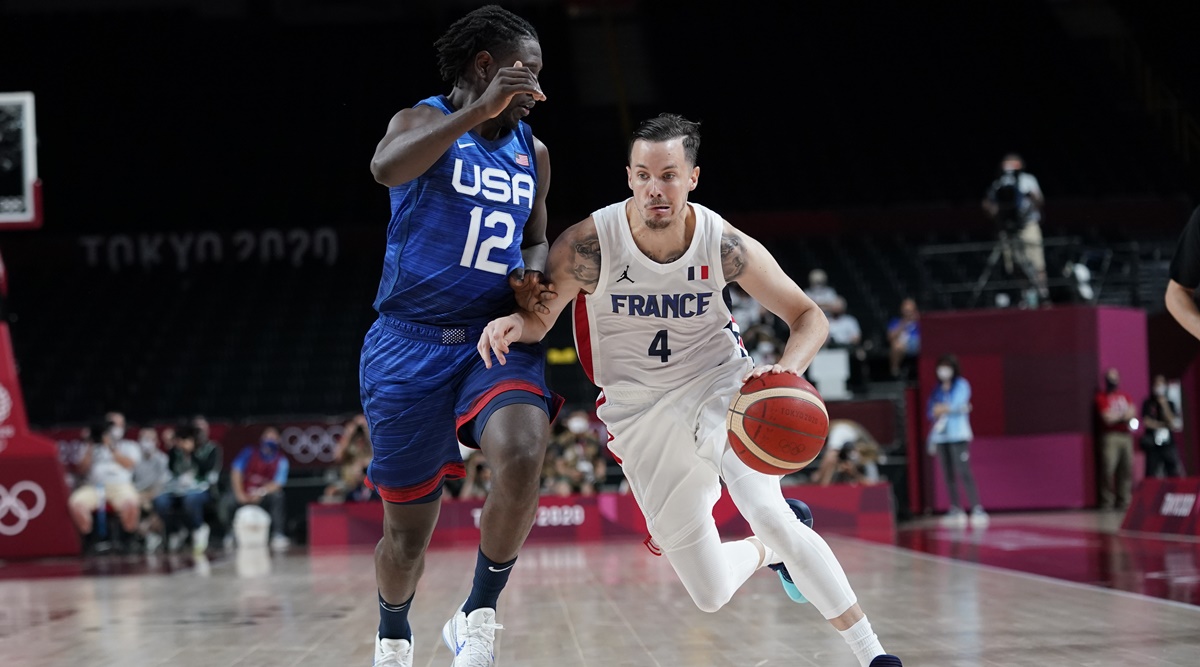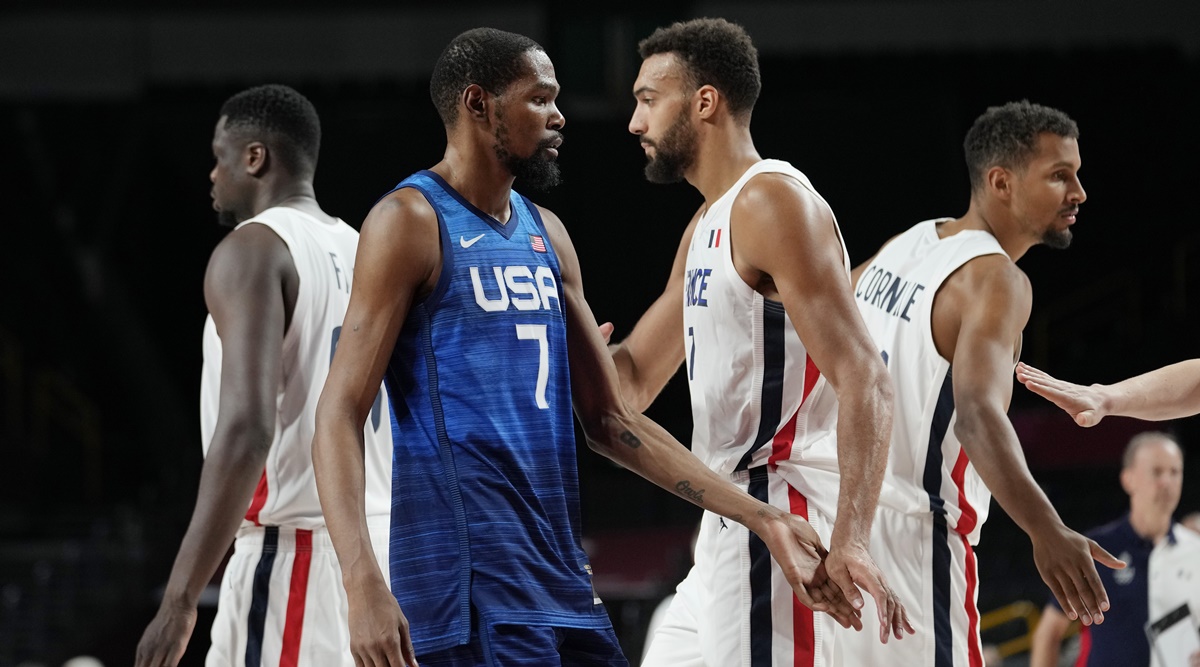No LeBron James, or Steph Curry or Anthony Davis has impacted the team. In their five practice games, they slumped to three losses and have now lost against a French team that has five of their 12 players playing in the NBA, including the DPOY in Gobert.
It took 16 years for the giants to fall, but it happened again. The United States Men’s basketball team succumbed to France 83-76 in an Olympic group stage match, triggering memories of that fateful loss in the semi-finals at 2004 Athens. But for those who have closely followed USA basketball as well as the NBA, the end of a 25-game win streak at the Olympics is not a surprising result. Rather, it was one that was bound to happen and has been coming for a while.
Historical superiority
The USA basketball team has always been based on how their game is played nationally – where individual brilliance and skill takes precedence over teamwork and cohesion, qualities that are facets of the European game. It is no surprise that in 1992 the Dream Team, led by players like Michael Jordan, Magic Johnson, Charles Barkley, and Larry Bird were considered the favourites and swatted aside every country on their path to the gold medal.
https://youtube.com/watch?v=wVef_g6YFbg%3Fversion%3D3%26%23038%3Brel%3D1%26%23038%3Bshowsearch%3D0%26%23038%3Bshowinfo%3D1%26%23038%3Biv_load_policy%3D1%26%23038%3Bfs%3D1%26%23038%3Bhl%3Den-US%26%23038%3Bautohide%3D2%26%23038%3Bwmode%3Dtransparent
But there is also a concurrent school of thought that believes that if the Soviet Union wasn’t disbanded and the Yugoslavians could field their best players, then the Dream Team would have received the backs-to-the-wall competition it deserved. Instead, what the Americans got was Croatia in the final, with Drazen Petrovic, a brilliant shooter who had a brief career in the NBA that was cut short by his death after a car accident in 1993. And Toni Kukoc, a power forward who later helped the Chicago Bulls in their second three-peat from 1996-98. What they were missing was Vlade Divac, a Serbian centre who played for the Sacramento Kings, was part of the Yugoslavian team. There was individual brilliance in that Yugoslavian team that never got their chance to go up against a team that, to this day, is considered the assembly of some of the greatest basketball players in the history of the game.
The aura of USA basketball
Since 1992 Barcelona, the course of history for basketball has been diverted to North America. In subsequent Olympics’ the Americans were always the favorites and by some margin. NBA stars would be the apple of the eye in Games villages across continents. They were not just expected to win, but to do so in style. Highlights of games featuring the US Olympic basketball teams continue to be plastered across social media to this date. Whether it is Vince Carter’s monstrous dunk on French player Frederick Weis, which is infamously called ‘the dunk of death’, or the national team beating Nigeria 156-73 at the London Games – the United States have been invincible for a while now. But no more.
How American basketball has changed
Over this past decade American basketball has changed in many ways. The game has transitioned further out to the three-point line. Team defense is more on the rise but individual defense, where one player locks up the best player of the opposing team, is clearly starting to fade away.
Many defensive players in the NBA complain about how the game has transitioned to favoring the capabilities of teams to score. A major part of this is how NBA referees are calling fouls. Some of the best players in the NBA find different ways of scoring and one of the best ways to do so is to play for a foul and head to the free throw line. An average NBA game can see anywhere between 30-45 fouls per game – which has become a great way for teams to score more.
How FIBA rules bring Team USA down to earth
While NBA players enjoy the benefits of easy foul calls that can lead to fruitful trips to the free throw line, the same rules get tossed out of the window when the International Basketball Federation (FIBA) rules kick in.
With more of an emphasis on team, as well as individual defence, Fiba rules have been a real eye opener for Team USA basketball stars. Players used to six fouls before being hauled out of the game, are now realising that Fiba has a five-foul limit. Some USA players were in disbelief when a goaltending call was given in favour of the rival team, since goaltending is legal according to Fiba rules.
“As the game goes on, as we continue to go through this process, we’re figuring out the difference between the international game and the game we play,” U.S. guard Damian Lillard said. “There’s been moments where we’re all looking around saying ‘what’s going on?’ We’re learning on the fly.”
The learning on the fly includes how backcourt fouls are officiated and what a ‘travel’ in Fiba rules is. It has essentially brought the scoring capabilities of this USA team down. That along with the game being for 40 minutes, with a 10-minute quarter, rather than the usual 48-minute game with 12-minute quarters that NBA stars are used to, has contributed to low scores and a lack of understanding of when to push pedal to the metal and when to defend every play. USA coach Gregg Popovich also reiterated that NBA players can no longer have a bad quarter, something they can get away with nationally. In the Olympics, all quarters are important, but none more so than the final eight minutes, where the USA’s talents of individual brilliance can best be activated – something that has not happened until now.
Newsletter | Click to get the day’s best explainers in your inbox
The international player divide
In the 90s and the 2000s, the NBA as a league started to invite more and more international players. It wasn’t that there weren’t international players before, just that the rate of their arrival became exponentially higher. The Euro league also developed into the second-best league in the world and was a factory of players that have now started to migrate to the NBA.
The results can be seen in today’s NBA. The Most Valuable Player (MVP) in the NBA is Nikola Jokic, a Serbian center who plays for the Denver Nuggets. The Finals MVP is Giannis Antetokounmpo, a Greek center who took the Milwaukee Bucks to their first NBA title this season since 1971. The defensive player of the year is Rudy Gobert, who won this honour for the third time. The 2021 All-NBA First Team was Giannis (Greece), Jokic (Serbia), Kawhi Leonard (USA), Luka Doncic (Slovenia), Steph Curry (USA) – a three to two ratio in favour of Europeans.
The Europeans are here and they are dominating the NBA and are no longer pushovers at the Olympics.
Does this mean Team USA is not winning gold at Tokyo?
This American team might not be as fine-tuned for international basketball as they would like, but it doesn’t mean they are not a force to be reckoned with. Kevin Durant and Damian Lillard are two Top 10 NBA players who can score at will. Draymond Green and Bam Adebayo can raise any team’s defense at any given point. Minor adjustments, coupled with when to score and where to pull out some defensive stops can go a long way for this team.
That being said, this is a weakened American squad. No LeBron James, or Steph Curry or Anthony Davis has impacted the team. In their five practice games, they slumped to three losses and have now lost against a French team that has five of their 12 players playing in the NBA, including the DPOY in Gobert.
For a variety of reasons, some of their top players have also foregone the Olympics this time. A quick start to the previous season because of Covid meant that American players never really got an extended break between two seasons last year. Participating in the Olympics would mean the risk of going two seasons without a sustained break, something that could easily result in injuries. All of these factors make the USA winning gold at the Tokyo Olympics a tougher task than it has been in decades. But that doesn’t mean they still aren’t favorites.
Source: Read Full Article





